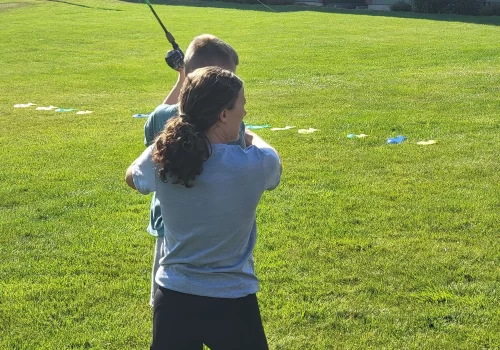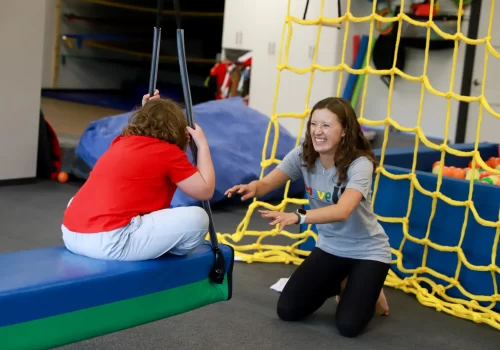Sensory processing disorders can cause children to feel overwhelmed or frustrated which can lead to perceived challenging behaviors. Although these behaviors are undesired, they are often the result of sensory dysregulation or a loss of self-control of their body and not necessarily intentional disobedience. Here are some tips on “discipline” for a child with sensory processing challenges:
- Put on your sensory glasses: Understand the challenge (Ayres, 1979) (Bialer, 2012).
- The first step is to understand that a challenge with sensory processing is a physical one involving the brain. When a child has the flu, they do not feel well or like themselves and therefore they are more apt to be irritable. More things go wrong which can lead to behaviors or actions out of the norm. When this happens, these behaviors are usually forgiven and allowed because the illness is interfering with the way the child behaves when they do feel physically well. This same forgiveness and allowance needs to be made for children with sensory processing challenges as well as this is a physical challenge they do not have control over without help.
- Anticipate and plan for undesired behaviors (Ayres, 1979) (Bialer, 2012).
- It is important to keep in mind that a child with sensory processing challenges has a nervous system that is not as stable as other children. This makes them emotionally fragile as well as quicker to reach a heightened state of alertness that leads to defiant behaviors.
- Identify the child’s triggers and learn how you can help them when they become triggered. Keep in mind, behaviors can be unique to each child so not all coping strategies will work for every child.
- Use a schedule to increase predictability so that your child knows what to expect for their day which in turn reduces stress overall for the entire family.
- Provide a child with forewarning to changes in regular routine
- Sensory Support First (Ayres, 1979) (Bialer, 2012).
- If a child loses control of their emotions and behaviors, immediate punishment is likely to lower a child’s self-esteem and ability to recover. The child already feels bad about losing control and punishment will likely make them feel worse.
- Instead provide sensory support to help them calm down first such as bringing them to a quiet room, provide them with a familiar item (blanket, toy, etc.), dimming the lights, provide opportunity for slow rocking/swinging, deep pressure hugs, etc.
- Support desired/expected behaviors
- Use “you can” language
- “You can take a break”, “You can do the hard things”, “You can do it!”, etc.
- Use only a few rules that are CLEAR and CONSISTENT – the simpler the easier for a child to understand and follow
- Introduce the rules when everyone is calm, NOT in the heat of the moment
- When discipline is needed do so without negative feelings
- Positive Rules Examples
- “Gentle hands”
- “Walking feet”
- “Listening ears”
- “Watching eyes”
- Use “you can” language
- Provide clear and specific examples of positive behavior (Bialer, 2012).
- “I like how you…. waited for me; took a break when you needed one; asked me nicely; etc. “
- Avoid vague expectations such as “be good”
- Try to NOT give attention to undesired behaviors: behaviors will get worse at first (they will try harder to get your attention)
- HOWEVER, safety first!! Intervene to control for safety
- Providing Discipline (Bialer, 2012).
- First, acknowledge the undesirable behavior but do not go into detail about it. Be clear, be concise. Second, communicate the desired behavior. Again, do not give too many details. Be clear, be concise. Third, provide disciple but do not go into a debate with the child over it. Simply tell the child what discipline is and why. Lastly, once you make the decision on disciple stick with it. A child with sensory processing challenges feels dysregulated and disorganized. Therefore, the discipline provided must be helpful in organizing a child’s brain, rather than disorganizing it. Providing consistency with discipline is helpful and effective.
If your child struggles with behaviors and you want to know if it is sensory related, we can help!
References:
Ayres, A. J. (1979). Sensory Integration and the Child. Los Angeles, CA: Western Psychological Services.
Bialer, D. S. (2012). No longer a secret: Unique Common Sense Strategies for children with sensory or motor challenges. Future Horizons Incorpora.



